
Danaë is a painting by the Dutch artist Rembrandt van Rijn. It was first completed in 1636, but Rembrandt reworked it significantly by 1643 at the latest. Once part of Pierre Crozat's collection, it has been in the Hermitage Museum, in St. Petersburg, Russia since the 18th century.
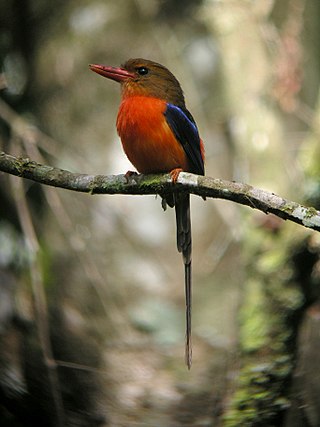
The brown-headed paradise kingfisher, also known as the russet paradise kingfisher, is a species of bird in the family Alcedinidae. It is endemic to the lowland forest in the Bird's Tail Peninsula. Its natural habitats are temperate forests and subtropical or tropical moist lowland forests. Like all paradise kingfishers this bird has colourful plumage with a red bill and distinctive long tail streamers. No subspecies are distinguished.

Agaronia testacea, a species of sea snail with the common name Panama false olive, is a marine gastropod mollusk in the family Olividae, which are known collectively as "the olives".
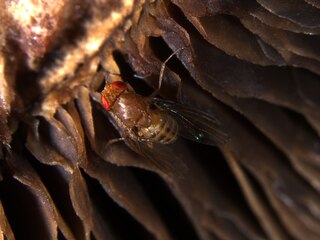
Drosophila is a paraphyletic subgenus of the genus Drosophila, a classification of fruit flies. This subgenus was first described by Alfred Sturtevant in 1939. Members of the subgenus Drosophila can be distinguished from other Drosophilid species by breaks in the pigmentation along the dorsal section of their abdomen.

Danae is a genus of handsome fungus beetles in the family Endomychidae. There are more than 90 species in Danae, 1 found in North America, about 10 in Asia, and the remainder in Africa.

Thyanta is a genus of stink bugs in the family Pentatomidae. There are about 19 described species in Thyanta.
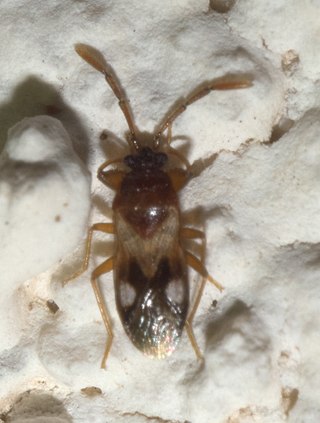
Tempyra is a genus of dirt-colored seed bugs in the family Rhyparochromidae. There are at least two described species in Tempyra.
Tmemophlebia is a genus of bee flies in the family Bombyliidae. There are about 16 described species in Tmemophlebia.
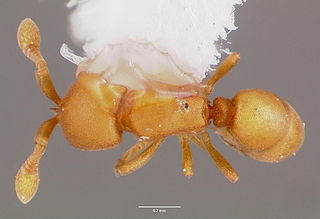
Discothyrea testacea is a species of ant in the family Formicidae.

Emmesa is a genus of false darkling beetles in the family Melandryidae. There are about five described species in Emmesa.
Xanthochroa testacea is a species of false blister beetle in the family Oedemeridae. It is found in North America.
Atomaria testacea is a species of silken fungus beetle in the family Cryptophagidae. It is found in Africa, Europe and Northern Asia, and North America.
Clastoptera testacea is a species of spittlebug in the family Clastopteridae. It is found in North America.
Monotoma testacea is a species of root-eating beetle in the family Monotomidae. It is found in Australia, Europe and Northern Asia, and North America.
Mordellina testacea is a species of tumbling flower beetle in the family Mordellidae. It is found in North America.

Alisalia is a genus of rove beetles in the family Staphylinidae. There are 10 described species in Alisalia.
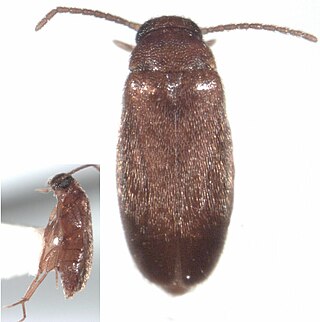
Scraptia is a genus of false flower beetles in the family Scraptiidae. There are more than 20 described species in Scraptia.

Microcara is a genus of marsh beetles in the family Scirtidae. There are about 10 described species in Microcara.
Sethenira is a genus of leaf-footed bugs in the family Coreidae. There are about five described species in Sethenira.

The Drosophila testacea species group belongs to the Immigrans-tripunctata radiation of the subgenus Drosophila, and contains 4 species: Drosophila putrida, Drosophila neotestacea, Drosophila testacea, and Drosophila orientacea. Testacea species are specialist mushroom-feeding flies, and can metabolize toxic compounds in Amanita mushrooms. The Testacea species group is studied for its specialist ecology, population genetics, and bacterial endosymbionts. The North American species Drosophila neotestacea is perhaps the best-studied of the group for its interactions with parasitic wasps and nematodes, bacterial endosymbionts, and trypanosomatid parasites. Of note, selfish X chromosomes have been discovered in three of the four Testacea group species.













